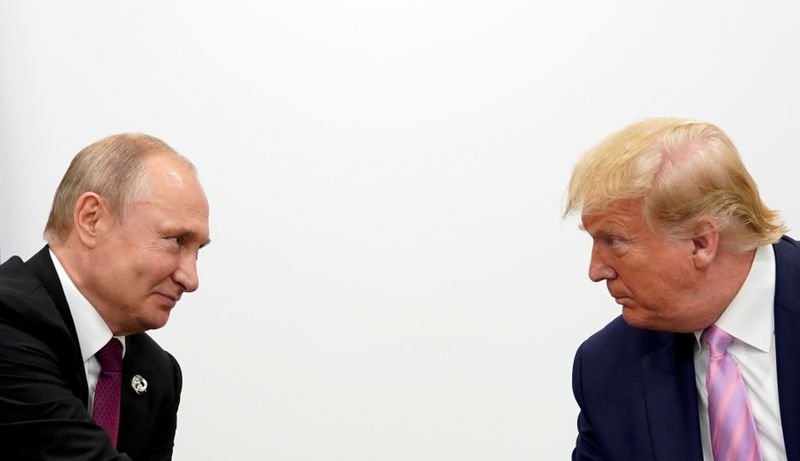By Timothy Gardner and Darya Korsunskaya
WASHINGTON/MOSCOW (Reuters) - U.S. President Donald Trump and Russian President Vladimir Putin agreed during a phone call on Monday to have their top energy officials discuss slumping global oil markets, the Kremlin said, as Trump called Russia's price war with Saudi Arabia "crazy."
The agreement marks a new twist in global oil diplomacy since a failed deal earlier this month between the Organization of the Petroleum Exporting Countries and Russia to cut production ignited the price war between Russia and OPEC's de facto leader Saudi Arabia.
The fallout from the coronavirus pandemic also helped to send oil prices into a historic tailspin, threatening higher-cost drillers in the United States and around the globe with bankruptcy.
"Opinions on the current state of global oil markets were exchanged. It was agreed there would be Russo-American consultations about this through the ministers of energy," the Kremlin said in a readout of the call.
White House spokesman Judd Deere said the two leaders had agreed on the importance of stability in global energy markets. U.S. Energy Secretary Dan Brouillette will talk with Russian Energy Minister Alexander Novak about "ways the world’s largest producers can address volatility in the global oil markets," Energy Department spokeswoman Shaylyn Hynes said.
The Kremlin did not say what exactly the ministers would discuss, but Moscow has previously signaled it would like to see more countries joining efforts to balance global oil markets.
Shortly before Monday's phone call, Trump said Saudi Arabia and Russia "both went crazy" in their oil-price war and that "I never thought I'd be saying that maybe we have to have an oil (price) increase, because we do."
"The price is so low now they're fighting like crazy over, over distribution and over how many barrels to let go," Trump said in an interview on Fox News.
The United States has grown in recent years into the world's largest oil and gas producer, thanks to a technology-driven shale drilling boom. But the current price of oil is below the production cost of many American drillers.
That has threatened the highly leveraged U.S. shale industry.
"We don't want to have a dead industry that's wiped out," Trump said in the interview. "It's bad for them, bad for everybody. This is a fight between Saudi Arabia and Russia having to do with how many barrels to let out. And they both went crazy, they both went crazy."
Goldman Sachs (NYSE:GS) analysts said that oil demand from commuters and airlines, which account for about 16 million barrels per day of global consumption, may never return to their previous levels.
Oil prices fell on Monday, with U.S. crude future (CLc1) dropping below $20 a barrel and international benchmark Brent (LCOc1) falling to 18-year lows.
The Trump administration is also seeking to persuade the world's top oil exporter, Saudi Arabia, to cut crude output, and will soon send a special energy envoy, Victoria Coates, to the kingdom.
In addition to oil and the pandemic, Trump said he and Putin would talk about trade and sanctions the United States has imposed on Russia.
After Washington imposed sanctions on two units of Russia's largest oil producer Rosneft (MM:ROSN) in Venezuela, the company said on Saturday it had sold the assets to an unnamed company owned by the Russian government.
The change of ownership means any future U.S. sanctions on Russian-controlled oil operations in Venezuela would target the Russian government directly. The Trump administration had accused Rosneft of providing a financial lifeline to Venezuela's President Nicolas Maduro, a socialist. Washington recognises opposition leader Juan Guaido as the country's legitimate interim president.
Late last year, Washington slapped sanctions on Russia's Nord Stream 2 natural gas pipeline, halting work on the project weeks before it was expected to be finished. Russia says the pipeline will be completed eventually. But the delay could allow increased competition for gas markets in Europe, where the United States is eager to export more liquefied natural gas.

Trump said in the Fox interview that Putin has been asking over the last two years for the sanctions to be lifted and probably would do so on the call. Kremlin spokesman Dmitry Peskov denied Trump's claim that Putin had made the requests over the course of the past two years, the TASS news agency said in a report.